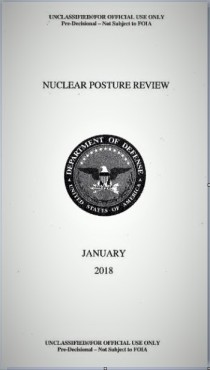Will America Propose First Use of Nuclear Weapons in Response to a Disabling Cyber Attack?
Introductory Note by Michel Chossudovsky

Featured image: A missile launch facility in North Dakota
A very dangerous narrative is unfolding within US military and intelligence circles.
It pertains to the use of nuclear weapons on a first strike basis as a means of “self-defense” in the case of a cyberattack by an enemy nation.
Cyberattacks cause disruptions in communications systems, transport, government services, financial transactions. They do not result in mass killings of civilians as in the case of an outright bombing campaign directed against an enemy nation.
What is contemplated in the 2017 NPR is the use of tactical nuclear weapons on a first strike basis against both nuclear and non-nuclear states, allegedly as a means of “self defense”.
This is nothing new. The preemptive nuclear weapons doctrine was first contemplated in George W. Bush’s 2001 Nuclear Posture Review in which a first strike pre-emptive use of tactical nuclear weapons was first formulated. B61 and the more recent B61-12 mini-nukes (bunker buster bombs with nuclear warheads) with an explosive capacity (yield) of up to 12 times a Hiroshima bomb were described as “harmless to civilians because the explosion is underground”.
Below are relevant excerpts of the Nuclear Industries article
Michel Chossudovsky, Global Research, February 2, 2018
***
According to the the Financial Times quoted by Nuclear Industries:
“The world has been living with the threat of a nuclear apocalypse since the 1950s. Over the past decade, intelligence experts have increasingly warned about the threat of a catastrophic cyber attack.
“Now the two fears appear to have merged, with the US on the point of revising its defence policy — to allow the use of nuclear weapons, in retaliation for a devastating cyber attack”.
According to Nuclear Industries commenting on Trump’s 2017 Nuclear Posture Review,
The [NPR 2017] “proposes to change US policy to allow the first use of nuclear weapons, in response to “attempts to destroy wide-reaching infrastructure, like a country’s power grid or communications, that would be most vulnerable to cyberweapons”.
Developed nations are now reliant on functioning computer systems. A concerted cyber attack, targeting critical infrastructure, could cause social turmoil and mass casualties. Security experts worry about a range of scenarios, including: viruses that shut down transport infrastructure, such as air-traffic control; that disrupt the operations of banks, causing the financial system to seize up and interfere with power generation and distribution.
Intelligence agencies have already considered the possibilities for cyber-retaliation. (Nuclear Industries)
By lowering the bar to the first use of nuclear weapons, it makes nuclear war more thinkable.
Dave Mosher (Business Insider) points out that hundreds of US nuclear weapons are already primed to use at a moment’s notice. This dangerous Cold War-era policy means such weapons can be launched within a few minutes of detecting an adversary’s pre-emptive nuclear strike — or a false signal of one.
He stresses need for frank discussions — in our homes, at work, and with elected officials — about the reality of nuclear weapons, including their numbers, risks, cost, and imminent threat to the future of humanity, adding:
“Every weapon we dismantle is one step away from the worst kind of mishap imaginable”.
*
All images in this article are from Nuclear Industries.


